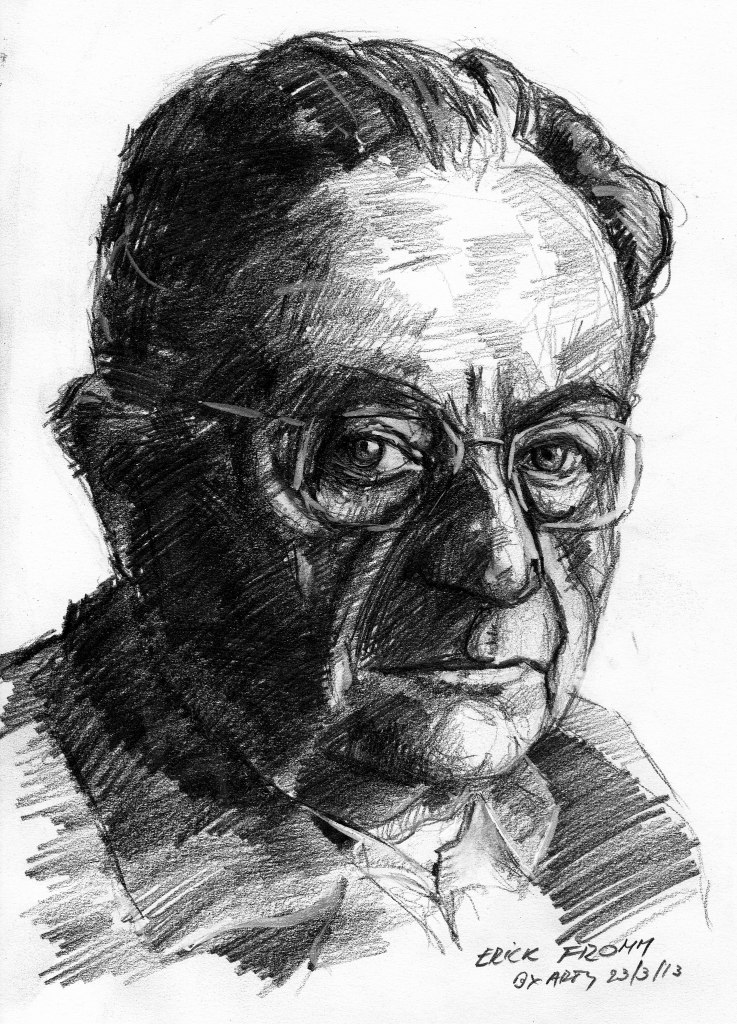
As technology has developed, especially over the past three centuries (but remember that Socrates was worried about the technology of writing), it has been accompanied by often very negative comments from writers, philosophers and other commentators. We’ve seen some contemporary worries expressed in recent posts. We shall look in future at some of the major commentaries about technology, especially electronic technology, in this and later posts.
We begin with a long series of quotations from The Revolution of Hope: Toward a Humanized Technology which was published in 1969, the work of Erich Fromm. Fromm was – among many other things – a psychologist, a psychoanalyst and a cultural critic. The title of his book suggests its important – a ‘humanized’ future rather than one where technology alone is the central aspect of life. This reflects concerns since at least the 17th century that human nature, human wellbeing and human potential may be stifled by machines. Fromm is a fascinating writer (he died in 1980), and he was immensely popular when alive, especially among the young. In many ways much of his writing is as relevant today as it originally was.
A specter is stalking in our midst whom only a few see with clarity. It is not the old ghost of communism or fascism. It is a new specter: a completely mechanized society, devoted to maximal material output and consumption, directed by computers; and in this social process, man himself is being transformed into a part of the total machine, well fed and entertained, yet passive, unalive, and with little feeling. With the victory of the new society, individualism and privacy will have disappeared; feelings toward others will be engineered by psychological conditioning and other devices, or drugs which also serve a new kind of introspective experience. As Zbigniew Brzezinski put it, “In the technetronic society the trend would seem to be towards the aggregation of the individual support of millions of uncoordinated citizens, easily within the reach of magnetic and attractive personalities effectively exploiting the latest communication techniques to manipulate emotions and control reason.” This new form of society has been predicted in the form of fiction in Orwell’s 1984 and Aldous Huxley’s Brave New World.
Perhaps its most ominous aspect at present is that we seem to lose control over our own system. We execute the decisions which our computer calculations make for us. We as human beings have no aims except producing and consuming more and more. We will nothing, nor do we not-will anything. We are threatened with extinction by nuclear weapons and with inner deadness by the passiveness which our exclusion from responsible decision making engenders.
How did it happen? How did man, at the very height of his victory over nature, become the prisoner of his own creation and in serious danger of destroying himself? In the search for scientific truth, man came across knowledge that he could use for the domination of nature. He had tremendous success. But in the one-sided emphasis on technique and material consumption, man lost touch with himself, with life. Having lost religious faith and the humanistic values bound up with it, he concentrated on technical and material values and lost the capacity for deep emotional experiences, for the joy and sadness that accompany them. The machine he built became so powerful that it developed its own program, which now determines man’s own thinking.
The answers to these questions differ. Among those who recognize the revolutionary and drastic change in human life which the “megamachine” could bring about …
Given these general aims, what is the procedure of humanistic planning? Computers should become a functional part in a life-oriented social system and not a cancer which begins to play havoc and eventually kills the system. Machines or computers must become means for ends which are determined by man’s reason and will. The values which determine the selection of facts and which influence the programing of the computer must be gained on the basis of the knowledge of human nature, its various possible manifestations, its optimal forms of development, and the real needs conducive to this development. That is to say, man, not technique, must become the ultimate source of values; optimal human development and not maximal production the criterion for all planning.
Are we confronted with a tragic, insolvable dilemma? Must we produce sick people in order to have a healthy economy, or can we use our material resources, our inventions, our computers to serve the ends of man? Must individuals be passive and dependent in order to have strong and well-functioning organizations?
My intention is to discuss the steps which, to me, are the most important ones: (1) Planning which includes the system Man and which is based on norms which follow from the examination of the optimal functioning of the human being. (2) Activation of the individual by methods of grass-roots activity and responsibility, by changing the present methods of alienated bureaucracy into one of humanistic management. (3) Changing of the consumption pattern in the direction of consumption that contributes to Activation and discourages “passivation.” (4) The emergence of new forms of psychospiritual orientation and devotion, which are equivalents of the religious systems of the past.